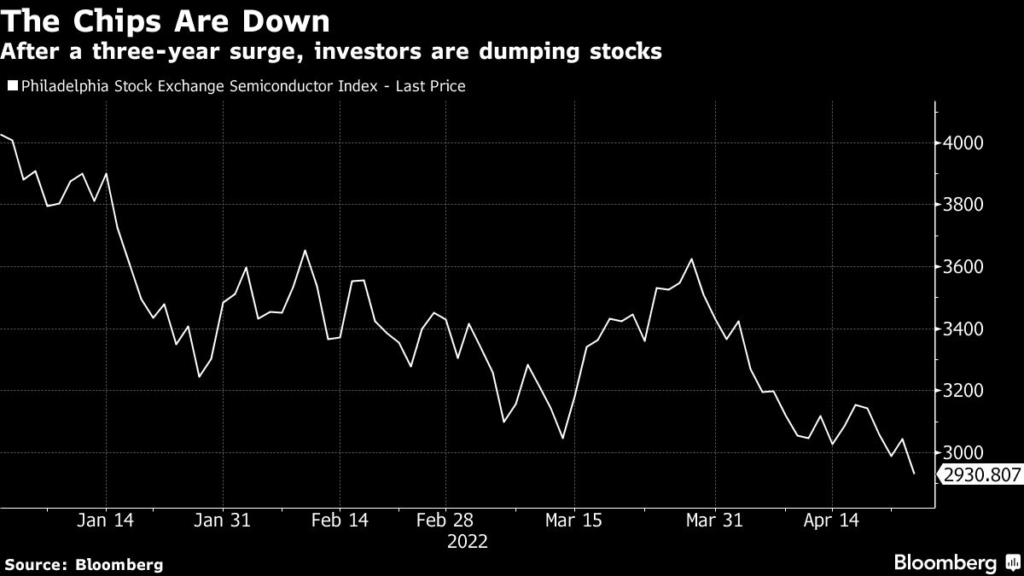(Bloomberg) — Texas Instruments Inc. tumbled in late trading Tuesday after China’s ongoing Covid-19 lockdowns crimped the company’s sales and profit forecasts, with the restrictions idling factories and slowing shipments.
Sales will be $4.2 billion to $4.8 billion in the second quarter, Texas Instruments said, below the $4.96 billion predicted by analysts. Profit is expected to be $1.84 to $2.26 a share, also short of estimates, which averaged $2.28.
Texas Instruments was forced to cut its revenue projections by about 10% as customers in China shuttered plants or reduced their operating levels, the company said. But so far the chipmaker isn’t suffering widespread order cancellations, suggesting that the problems are more about logistics than a broader drop in demand for electronics.
“There are many customers that are just shut down — they’re not taking deliveries,” Chief Financial Officer Rafael Lizardi said in an interview. It’s too early to say when those factories will come back online, how quickly they’ll catch up with lost production or if Chinese consumers are spending less in the lockdown, he said.
Texas Instruments is the largest maker of analog and embedded processing chips, which go into everything from household appliances to military and space hardware. It has tens of thousands of products and customers, making its predictions an indicator of demand across the economy.
Chip buyers have struggled with shortages over the past year, but not all products are in tight supply. Customers have been expediting orders for certain products they need to complete sets of components they already own, Lizardi said. That could mean that there’s an overall accumulation of inventory typically associated with a “cyclical correction,” but “we stay away from calling the cycle up or down,” he said.
Texas Instruments’ earnings are an important signpost for investors who are concerned the chip industry is poised to suffer one of its periodic gluts after ramping up too much production. The Philadelphia Stock Exchange Semiconductor Index has fallen 26% this year, worse than the major indexes.
Market research firm Gartner Inc. expects overall industry sales to grow 14% this year, but it sees the increase decelerating to just 3.6% in 2023. The slowdown follows a 26% surge last year, when the pandemic helped fuel demand for chips.
Texas Instruments shares fell as much as 9% in extended trading Tuesday before recovering to a roughly 5% drop. The stock, which gained 15% last year, had declined less than other chipmakers in 2022 through Tuesday’s close.
Fourth-quarter net income rose to $2.35 a share from $1.87 a share a year earlier. Revenue increased 14% to $4.9 billion. On average, analysts estimated $2.20 a share on revenue of $4.72 billion.
Analysts and investors have become concerned that while there are still shortages of some types of chips, there’s growing unused stockpiles of others. Once key parts become available, that might cause a fall off in orders, some have predicted.
Texas Instruments reported that its in-house inventory is increasing but that stockpiles are still at levels that are lower than it would normally carry. It added $150 million of inventory but is still nowhere near its target of having 190 days’ worth, Lizardi said.
Unlike management teams at some chipmakers, Texas Instruments leaders have been cautious about predicting an extended period of growth for the industry. Many of the company’s peers have argued that the increasing use of chips in a wider variety of devices makes the market more stable. Texas Instruments executives, in contrast, have said that the future balance between supply and demand is impossible to gauge with any degree of certainty.
Texas Instruments manufactures about 80% of its chips in its own factories, and the Dallas-based company is investing to expand that footprint. Most other chipmakers are more reliant on outsourced manufacturing, which has impeded their ability to meet the flood of orders received during the pandemic.
(Updates CFO comments in fourth paragraph.)
More stories like this are available on bloomberg.com
©2022 Bloomberg L.P.











